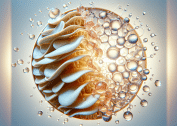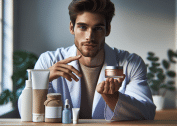Unlock the secrets of radiant, glowing skin with proven skin rejuvenation tips that go beyond the basics. This ultimate guide covers methods, routines, and insider advice to help foster natural beauty, enhance wellness, and support a youthful appearance for nearly any skin type.
Understanding Skin Rejuvenation and Its Significance
Skin rejuvenation is more than just a passing trend in beauty and wellness circles. It reflects a holistic approach, focusing on restoring the skin’s vibrance, elasticity, and youthful look through methods that are both preventive and restorative. For some, the process can involve professional treatments or products that encourage cellular renewal, while others rely on time-honored home remedies. This diversity reveals that effective rejuvenation combines science, habit, and awareness. Exploring these different approaches helps individuals assess which practices align best with their unique needs, supporting the journey toward healthier, glowing skin.
The demand for reliable skin rejuvenation routines continues to grow as people recognize the impact of environmental stress, pollutants, and lifestyle choices on skin quality. Factors like UV radiation, dehydration, and nutrient deficiencies contribute to dullness, fine lines, and hyperpigmentation. By understanding their significance, individuals are better equipped to implement protection and repair strategies from trusted sources, such as gentle exfoliation, antioxidant-rich serums, and hydration-focused routines. The result is not just improved aesthetics, but also an overall boost in skin resilience and health.
Seeking practical guidance is essential, especially with countless products and techniques available. A balanced approach involves staying informed about the evidence behind popular beauty ingredients and dispelling common skincare myths. Medical organizations, dermatologists, and reputable wellness communities share research-backed advice about skin renewal that supports making smarter choices. Whether through in-office procedures or daily self-care, focusing on validated skin rejuvenation tips leads to healthier, brighter results that last longer, helping users feel more confident in their own skin.
Key Factors That Influence Skin Renewal
Many underestimate the diverse influences on skin’s ability to regenerate. Genetics certainly play a part, but external factors like sun exposure and pollution have significant effects. Daily sun protection stands out as one of the top recommendations by dermatologists for preserving youthful skin and preventing pigmentation issues. Sunscreens, wide-brimmed hats, and seeking shade are not just summer habits; they provide a daily defense critical for any effective skin rejuvenation plan. Routine protection allows the skin’s renewal processes to work without disruption, making it easier to maintain desired results over time.
Nutrition is another powerful driver of healthy skin renewal. Consuming antioxidant-rich foods, such as berries, plant oils, leafy greens, and nuts, helps the skin fight oxidative stress and build new, vibrant cells. Hydration is equally important; adequate water intake supports the skin barrier and elasticity. Some studies link vitamin C and E-rich diets to improved skin tone and reduced wrinkles. When combined with topical treatments containing similar ingredients, these lifestyle choices maximize the results of rejuvenation routines, offering benefits from the inside out.
Lifestyle influences don’t end with what we eat or the products we use. Quality sleep enables the body and skin to repair at the cellular level, while chronic stress can impair skin’s healing capacity and accelerate the aging process. Integrating practices like meditation, regular exercise, and mindful skincare habits whose benefits are supported by research, creates a powerful synergy for maintaining skin health. Understanding all these factors helps demystify the science of skin renewal, empowering people to make choices that contribute to visible and long-term improvements.
Home-Based Skin Rejuvenation Techniques That Work
Home care remains a central element of any skin rejuvenation journey. Simple practices, such as consistent cleansing, gentle exfoliation, and facial massage, promote circulation and the removal of dead cells. Using mild cleansers that respect the protective skin barrier is crucial, while over-exfoliating can have the opposite effect, leading to irritation or increased sensitivity. Many dermatological associations recommend exfoliating only once or twice a week for most skin types. Additionally, facial massages with natural oils like jojoba or squalane are linked to improved blood flow and a brighter complexion, even without expensive spa visits.
Homemade masks can provide extra benefits by delivering nourishing ingredients directly to the skin. Recipes such as those combining honey, yogurt, turmeric, or oatmeal have gained popularity for their purported hydrating, soothing, and clarifying effects. These natural options are widely appreciated for their simplicity and safety, though it’s essential to patch test before use, especially for sensitive skin. For those seeking more advanced solutions, at-home tools such as LED facial wands, microcurrent devices, or microdermabrasion kits are available, though these should be researched carefully for safety and efficacy. Always follow manufacturer guidelines and consult with professionals when trying new devices.
Beyond topical treatments, maintaining a skin-friendly environment is essential. This includes using humidifiers during dry seasons, choosing pillowcases made from gentle fabrics, and regularly cleaning bedding and personal devices that touch the face. Subtle adjustments can limit exposure to bacteria and allergens that may undermine skin renewal efforts. Pairing home-based methods with good hygiene and patience sets the stage for gradual, sustainable skin improvements, strengthening confidence in one’s skincare routine and overall well-being.
Emerging Professional Treatments to Watch
Innovations in professional skincare bring a variety of treatments designed to boost skin rejuvenation. Options such as chemical peels, microneedling, laser therapy, and minimally invasive injectables offer targeted solutions for various concerns, from texture refinement to pigment correction. Chemical peeling uses gentle acids to remove damaged layers, revealing fresher skin beneath, while microneedling stimulates collagen formation for improved elasticity and reduced scarring. Many reputable clinics, guided by board-certified dermatologists, prioritize evidence-based use of these options to ensure safety and effective outcomes.
Laser and light-based therapies are rising in popularity for their customizable approach. Fractional lasers, intense pulsed light (IPL), and LED technologies can address specific concerns like redness, sun spots, or fine lines. Some treatments require little downtime, making them accessible even to those with busy schedules, yet they work best as a series rather than a one-time fix. Regular maintenance, alongside sunscreen and gentle at-home care, maximizes the benefits and longevity of these professional rejuvenation treatments.
Injectable treatments, such as hyaluronic acid fillers or neuromodulators, continue to evolve in both formulation and technique. When performed by experienced professionals, they provide subtle enhancements that support a natural appearance, smoothing wrinkles or adding volume where needed. It is crucial to consult with licensed practitioners, discuss individual goals, and be aware of the risks and aftercare. Ultimately, professional treatments should complement—not replace—a strong personal skincare foundation, creating a multi-faceted and effective approach to skin renewal.
The Role of Consistency in Achieving Results
Maintaining a consistent skincare routine is fundamental to realizing meaningful change. The benefits of rejuvenation don’t happen overnight—regular application of moisturizers, serums, and sunscreen forms the cornerstone of success. By tracking progress and adjusting routines as needed, individuals are better able to identify what works and what does not. Setting achievable goals, such as improved hydration or reduced breakouts over several weeks, keeps motivation high and encourages long-term adherence. It’s this day-in, day-out attention that helps maintain visible improvements and overall skin vitality.
Measuring results can sometimes be challenging. Wellness experts often suggest using photos or a skincare journal to document changes, monitor product reactions, and note seasonal variations. Seeking guidance from dermatologists or licensed aestheticians provides valuable perspectives, helping refine routines and troubleshoot persistent issues. Reliable feedback and regular check-ins build confidence, ensuring techniques are both safe and tailored to individual needs. Combining personal tracking with professional advice delivers a holistic strategy for ongoing skin rejuvenation.
Patience and gentle self-care are often the missing links in many routines. Overdoing active ingredients or switching products too frequently can undermine progress, irritating the skin and stalling results. Instead, building a balanced plan with tested ingredients—like hyaluronic acid, niacinamide, or peptides—and avoiding common pitfalls helps preserve gains. Remember: skin thrives with regularity, care, and protection. Staying informed about new developments, staying skeptical of overhyped claims, and listening to one’s own skin fosters a positive, empowered relationship with beauty and wellness as a whole.
Common Myths About Skin Rejuvenation Debunked
Misinformation often clouds the world of wellness and beauty. Numerous myths persist, such as the idea that more expensive products guarantee better results or that DIY remedies work for everyone. Evidence shows product efficacy depends on ingredients, formulation, and suitability for specific skin types. Some ingredients, though hailed as natural, can still cause reactions. Trusted organizations urge critical evaluation of viral beauty trends, recommending users validate claims with credible science and medical advice.
Another misconception involves the promises of instant transformation. Professional and at-home treatments both require regular, repeated use to see lasting changes. Similarly, aggressive interventions such as frequent chemical peels or extractions often disrupt the skin’s balance, causing more harm than benefit. Experts suggest erring on the side of caution, prioritizing gentle care, and opting for gradual progress over rapid, unsustainable fixes. Seeking out resources from licensed dermatologists further protects against disappointment or potential side effects.
Finally, there’s the false belief that skin rejuvenation is only for certain age groups or skin types. Research and practical experience confirm that all individuals can benefit from healthy routines, whether for prevention, repair, or maintenance. Ingredients like SPF, antioxidants, and mild moisturizers remain universally recommended, while tailored approaches ensure personal needs are addressed. Knowledge empowers users to sift through myths, make more informed choices, and embrace the full spectrum of options for radiant skin.
References
1. American Academy of Dermatology. (n.d.). Skin care and rejuvenation. Retrieved from https://www.aad.org/public/skin-hair-nails/skin-care
2. Harvard Health Publishing. (n.d.). Collagen and skin aging: what you should know. Retrieved from https://www.health.harvard.edu/staying-healthy/collagen-and-skin-aging
3. Cleveland Clinic. (2022). Skin rejuvenation. Retrieved from https://my.clevelandclinic.org/health/treatments/11286-skin-rejuvenation
4. Mayo Clinic. (n.d.). Facial rejuvenation overview. Retrieved from https://www.mayoclinic.org/tests-procedures/facial-rejuvenation/about/pac-20384905
5. U.S. Food and Drug Administration. (2020). Injectables for facial rejuvenation. Retrieved from https://www.fda.gov/consumers/consumer-updates/facial-fillers-and-botox-cosmetic-fda-warns-against-undergoing-procedures-unapproved
6. Johns Hopkins Medicine. (n.d.). Skin care: Tips for healthy skin. Retrieved from https://www.hopkinsmedicine.org/health/wellness-and-prevention/skin-care-tips-for-healthy-skin









